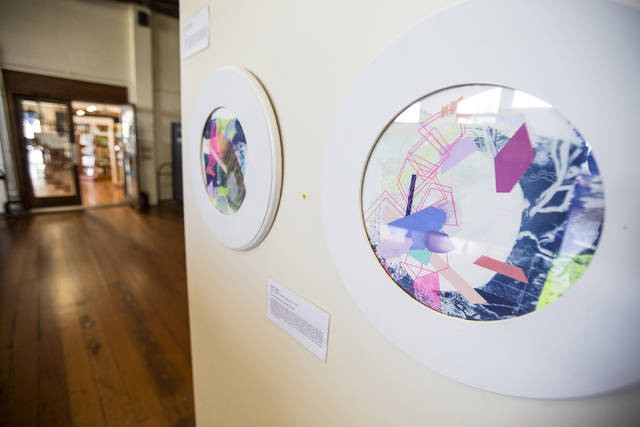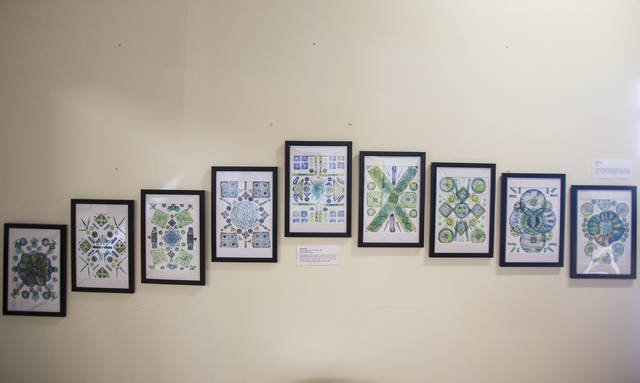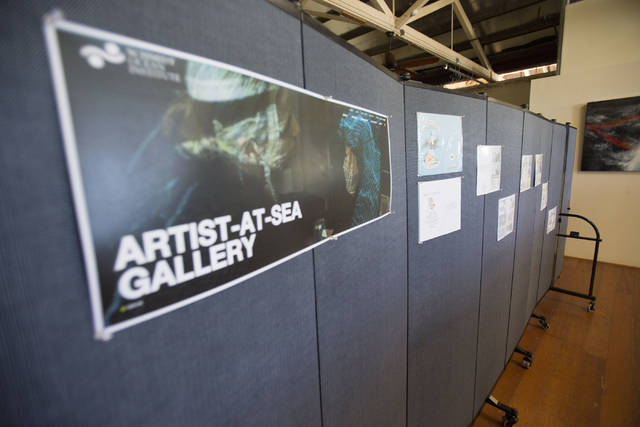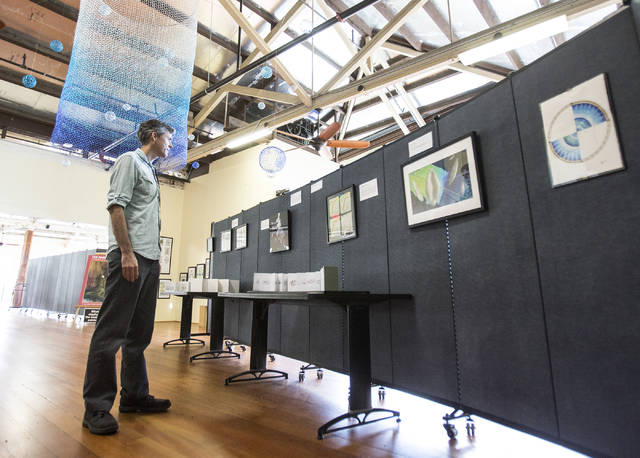Anew art exhibit now on display at the Mokupapapa Discovery Center in downtown Hilo brings ocean science to the masses in creative, visual ways.
On display through mid-February, the exhibit showcases artwork from the Schmidt Ocean Institute’s Artist-at-Sea program and features more than 50 pieces from and inspired by artists who participated on science expeditions aboard the institute’s research vessel, Falkor.
Artwork includes watercolor paintings, drawings, photography, fiber art, resin art and data visualizations.
Schmidt Ocean Institute is a nonprofit organization that aims to advance oceanographic research and its Artist-at-Sea program applies artists’ storytelling abilities to ocean science and conservation.
“Art is a great way to introduce the subject matter to the public and to capture new audiences,” which is not only beneficial for the artists, but scientists as well, said Carlie Wiener, senior communication manager for Schmidt Ocean Institute. That’s “something we didn’t expect. It makes (the scientists) think about their data in a different way and makes them more creative.”
According to Wiener, a traveling exhibit has been to 12 locations across North America since 2017.
But this is the first time the exhibit has come to Hawaii Island and will feature a few new pieces not seen before, including some from Hawaii-based artists, she said.
Mokupapapa Discovery Center, located at 76 Kamehameha Ave. in Hilo, is the interpretive facility for Papahanaumokuakea Marine National Monument, where visitors can learn about the natural and cultural features of the northwestern Hawaiian islands.
Wiener said Schmidt Ocean Institute has done “quite a bit of work” in the northwest Hawaiian islands, including mapping, which is one of its connections to Mokupapapa.
She hopes guests will be inspired by the work and the variety, as well as the “amazing creatures and research being done in the ocean.”
“We know more about the backside of the moon than we do the deep ocean,” Wiener said. “So being able to bring knowledge about the species that reside in the deep ocean and the importance of it to everybody’s lives is necessary. We can’t protect what we don’t know. It’s important people know what’s out there.”
Mokupapapa manager Andy Collins said the discovery center is the gateway into Papahanaumokuakea.
It’s important to have different ways of understanding not just the science, but the natural and cultural features of the area, Collins said and he hopes people will “look at this exhibit and understand a little more about the science and what is being done and why.”
Science, he said, is abstract, and mapping, for example is not commonly understood.
“So maybe looking at the technology side through art will help people understand what the scientists are doing and why it’s important.”
The exhibit, said Collins, is just another way for visitors to “connect with the science in a way that they may be able to relate to.”
Among Hawaii artists participating, Honolulu-based artist Sarah Caudle will have a new piece in the show titled “Lava Flows,” a Big Island-inspired depiction of eruption activity that began in May in lower Puna.
Caudle, who originally hails from Georgia, said she has been drawing and painting her whole life, but when she moved to Hawaii five years ago, she felt “such a connection with the ocean” that she “really wanted to express the way it makes me feel in more of a fluid manner.”
Prior to her Science-at-Sea stint, Caudle said she had never done any kind of artist residency program. She went on a one-week expedition from San Diego to Portland, Ore. in July, where they studied sea floor mapping.
“Coming back, I was so inspired to really delve more into science and to be able to use my art to share with others what is happening from an environmental perspective.”
She painted “Lava Flows” when she was back in Hawaii.
With “so much happening in Hawaii, I felt like I needed to share that,” Caudle said. “I always felt such a strong connection to the Big Island. … Watching the lava flow is really beautiful, but also full of destruction. Such a powerful thing happening on our island, so much needs to be understood and shared from it.”
Caudle said she wanted to submit a “statement piece, really focusing on the fact that the forces of nature are so much stronger than our control. What is in our control is studying our transforming earth so that we can better understand and protect it for the future.”
Mokupapapa is free to the public and open from 9 a.m. to 4 p.m. Tuesday-Saturday.
Schmidt Ocean Institute currently has an open call for 2019 Artist-at-Sea participants. For more information, visit schmidtocean.org.
Email Stephanie Salmons at ssalmons@hawaiitribune-herald.com.













